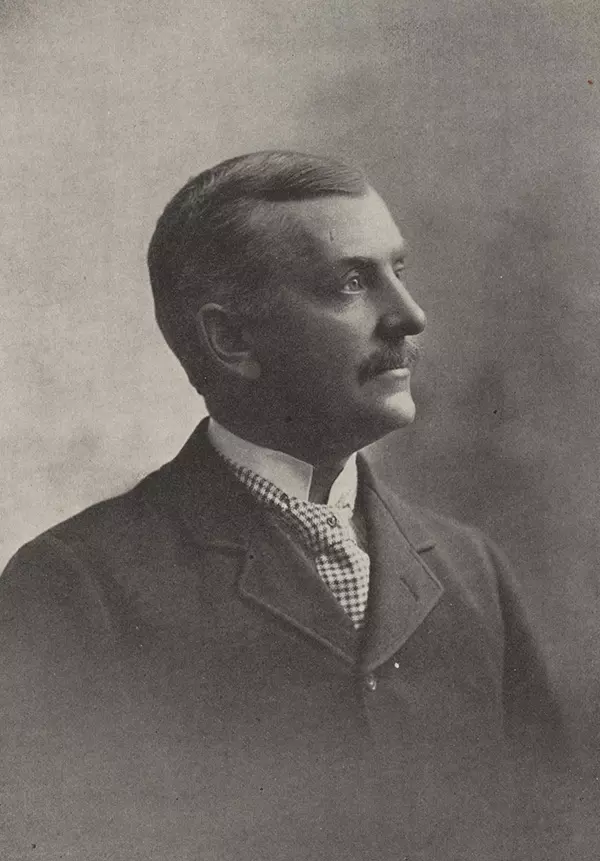Timothy Messer-Kruse
Samuel Milton "Golden Rule" Jones was nominated for mayor of Toledo at a tumultuous Republican convention on February 25, 1897. That day would usher in a nearly two decade period of reform government in the city and would propel Mayor Jones to national, and even international fame. Jones was an oilman who immigrated with the westward progression of oil strikes from Pennsylvania to Ohio. In 1894 he founded a factory to manufacture drilling equipment in Toledo and soon earned a reputation for his honest business dealings and his humanitarian policies. After announcing that only one rule was needed in his plant and then nailing a plaque bearing Jesus's Golden Rule to the wall, he earned a nickname and a place as a leader of Progressive reform.
As mayor Jones aligned himself with the progressive forces of Toledo who had long championed greater municipal regulation of the economy. With their help Jones succeeded in securing the city's first civil service system, fostered the growth of the city's park system, cracked down on police brutality, and expanded relief programs for the indigent and poor. Unlike other progressives, Jones did not believe in using the city's police power to enforce morality. He refused to prosecute prostitutes or shut down beer halls. Whenever he could, Jones presided over the city's police court and dismissed most of the cases brought before him out of sympathy for the poor. The poor, Jones said, "have no money, they have no council and for petty offenses that are not offenses at all when committed by the rich, they are fined, imprisoned, disgraced and degraded."
A strong advocate of municipal ownership of public utilities, Jones attempted but failed to win passage of an ordinance creating a city-owned power plant. In his third term, Jones squared off against powerful streetcar companies and attempted to set a maximum streetcar fare.
Jones died suddenly in 1904 at the age of 57. His legacy carried on under the administration of Brand Whitlock and in his writings, some of which are reproduced below.
-Timothy Messer-Kruse
[NOTE: The publications reproduced below vary in visual quality. A few, because they were reproduced from microfilm, are of poor quality when viewed on a screen. Nearly all of them look better when printed on paper. A few of the documents below have been scanned into a text [PDF] format.
Writings About Jones
- "Swing to Party Politics More Evident since 1939 [A History of the Independent Political Movement] from The Blade, Nov. 11, 1951 [link to Google News Archive] [PDF]
- A Short Biography of Samuel Jones (Woodlawn Cemetery Necrology)
- James H. Rodabaugh, "Samuel M. Jones: Evangel of Equality," from the Northwest Ohio Quarterly
- "The Golden Rule Factory" by Frank T. Carlton, published in The Arena Oct. 1904, pp. 408-410.
- "Samuel Milton Jones: The Golden Rule Mayor" by One Who Knew Him, published in The Arena Feb. 1906, pp. 126-132.The Arena"Samuel Milton Jones: The Golden Rule Mayor" by One Who Knew Him, published in The Arena Feb. 1906, pp. 126-132.
The Jones Campaign of 1897
- "Sam Jones Winner: A Splendid Man Nominated for Mayor" The Blade Feb. 25, 1897
- "For Elevation of Labor: S.M. Jones Stands for Best in American Manhood" The Blade Feb. 26, 1897
- "Swinging to Jones: All Democrats Save Office Seekers Friendly to Him" The Blade Feb. 26, 1897
- "Municipal Reform (an editorial)" The Blade March 29, 1897 [PDF]
- "An Element in the Local Contest (an editorial)" The Blade March 31, 1897 [PDF]
- "Dignity of Honest Toil: S.M. Jones Addresses the Good Government Club" The Blade March 31, 1897 [PDF]
- "It is Mayor Jones!: Toledo Republicans Add Another Glorious Victory" The Blade April 6, [1897] [PDF]
The Writings of Jones
- "Patience and Education The Demands of the Hour" published in The Arena May 1901, pp. 544-546. [PDF]
- "A Plea for Simpler Living" published in The Arena April 1903, pp. 345-348. [PDF]
- "Municipal Expansion" published in The Arena June 1899, pp. 766-767. [PDF]
- The Mayor's Message for the Year Ending April 1, 1898
- The New Right: A Plea for Fair Play Through A More Just Social Order, (New York: Eastern Book Concern, 1899) [Open Access via Ohio Memory]

